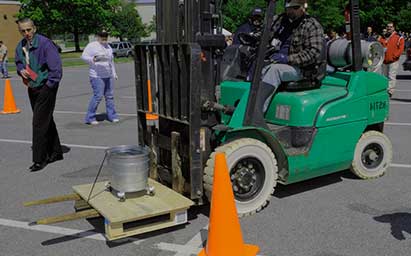In the recent past, I attended several local competitors’ operator training classes. I had hoped to pick up some good training tips, see the content of each class, and learn about any weaknesses that might assist me if we went head to head for a customer. Seeing how the trainers conducted classes and how they might have benefited from a forklift train the trainer class was something to keep in mind. I would guess that not many trainers have attended their competitor’s classes, but I found it very enlightening.
I picked three programs at random to audit, but all were offered by dealerships representing major brands of forklifts. On the positive side, I did find some interesting statistics in several classes and got some ideas for a few new slides to add to our training. It was also interesting to watch how each trainer interacted with the classes, the questions they asked, props they used, and other techniques.
On the less positive side, I was fairly shocked to see how some of these forklift training programs were operating. Their downfalls are common and are worth noting for the benefit of our industry as a whole. Listed below are some of the things I witnessed as I attended the three classes, though not every problem was present in each program.
- One instructor started conducting a re-evaluation class, which was actually promoted as a certification class. When he found out a few operators had not be previously certified, and that one had never been on a forklift in his life, he continued on with the same exact PowerPoint program saying he could cover all the topics they would likely need. The class claimed to cover type 1-6 forklifts in 2 hours of classroom time.
- In one class, I met an operator that had never driven a forklift in his life and struggled with the written test in English. I will never know how he did since he was asked to grade his own test during the classroom portion! During the hands on portion, he was put on a forklift with no practice and promptly collapsed some shelving during his evaluation. Hands shaking, he parked the lift and the instructor told him he passed and would get his certification in the mail. Afterward, I asked about the operator’s performance and the instructor told me that he had only failed a handful of people in over three years of being a full time trainer.
- One instructor made the comment “this is not a pass or fail thing, it’s just training. I’m not here to make the call whether you pass or fail.” He followed that up by giving the class a 40 question test. Eleven of those questions were graded, but the other 29 he gave out the answers to without having the class even attempt to answer them on their own! The final passing score reflected the total of 40 questions, not just the 11 that were legitimate.
- All three classes conducted the hands on portion at their dealerships and then issued certification cards to every student, which is NOT OSHA COMPLIANT. Only one instructor noted that the evaluations would have to be done again in the actual workplace and on their own forklifts. No paperwork was issued stating that the hands on evaluations needed to be done at the end users site and on their forklifts; therefore, the employers would assume, incorrectly and unfortunately for them, that the training was complete. OSHA very clearly states in CPL 2-1.28A – Compliance Assistance for the Powered Industrial Truck Operator Training Standards: Can the evaluation required by (l)(2)(ii) be based entirely on observation of the operator in a training facility outside the workplace? The evaluation must take place in the workplace so that the evaluator can observe the operator under actual workplace conditions.
In summary, I thought training had come a lot further in the last 20 years, but I was very disappointed in some of what I encountered during these classes. I would suggest that if you manage a forklift dealership or safety training company that you stay in touch with what is happening at a grass roots level. Take your own classes once in a while, see what is happening, and make sure your company is at least meeting the bare minimum OSHA forklift requirements, if not more. Ask yourself, is this the type of training you would want for your son or daughter if they were learning to operate a 10,000 pound machine?

